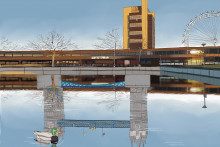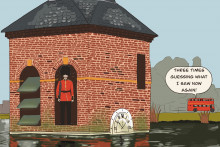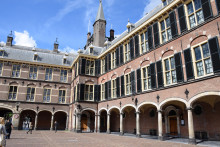U-Today
Free - in store
 Spotlight
SpotlightFormeel is Engels nu vijf jaar de gesproken en geschreven taal op de UT, maar de landelijke politiek zet anno 2023 een tegenbeweging in. In een drieluik reconstrueert U-Today hoe de universiteit in woord en gebaar veranderde van ‘Universiteit Twente’ in ‘University of Twente’. In deel 2: Hoe de UT-gemeenschap laveert tussen het principiële en het praktische, het willen tegenover het moeten.
 Spotlight
SpotlightFormally, English has already been the UT’s spoken and written language for five years, but national politics is creating a counter-movement as of 2023. In a trilogy, U-Today reconstructs how the university changed in word and gesture from 'Universiteit Twente' to 'University of Twente'. In part 2: how the UT community is navigating between the principal and the practical, and wanting to as opposed to needing to.
 Spotlight
SpotlightFormeel is Engels nu vijf jaar de gesproken en geschreven taal op de UT, maar de landelijke politiek zet anno 2023 een tegenbeweging in. In een drieluik reconstrueert U-Today hoe de universiteit in woord en gebaar veranderde van ‘Universiteit Twente’ in ‘University of Twente’. In deel 1: hoe kwamen de besluiten om over te gaan op het Engels tot stand?
 Spotlight
SpotlightFormally, English has already been the UT’s spoken and written language for five years, but national politics is creating a counter movement as of 2023. In a trilogy, U-Today reconstructs how the university changed in word and gesture from 'Universiteit Twente' to 'University of Twente'. In part 1: how did the decisions to transition to English come into being?
 News
NewsDe universiteiten moeten onmiddellijk weer in het Nederlands gaan lesgeven, vindt Beter Onderwijs Nederland. Met negentien open brieven aan minister, bestuurders en toezichthouders begint de vereniging een nieuw offensief.
 News
NewsUniversities in the Netherlands should immediately start teaching in Dutch again, in the view of action group Beter Onderwijs Nederland (BON). The association has launched a new offensive with nineteen open letters to the minister, administrators and regulators.
Het wetsvoorstel tegen de verengelsing van het hoger onderwijs (Taal & Toegankelijkheid) loopt vertraging op. De Eerste Kamer wil er pas over praten als er een nieuwe regering zit.
Proposed legislation against the Anglicisation of higher education (Language and Accessibility) has encountered a delay. The Dutch Senate only wants to discuss it when a new government has been installed.
Wordt dit geen papieren tijger? En waar bemoeit de overheid zich eigenlijk mee? De Eerste Kamer plaatst vraagtekens bij de wet die verengelsing van het hoger onderwijs moet tegengaan.
Are we creating a paper tiger? And why should the government even get involved in such an issue? The Dutch Senate has voiced serious reservations about a new law that is intended to stop the anglicisation of higher education in the Netherlands.
 News
NewsDe Tweede Kamer baalt nog steeds dat de universiteiten van Twente en Eindhoven het Engels officieel tot hun voertaal hebben verheven. Sussende woorden van de minister mochten niet baten.
 News
NewsThe House of Representatives is still unhappy with the fact that the University of Twente and Eindhoven University of Technology have elevated English to the status of official language of communication at their respective institutions. The minister’s appeasing words have not been able to calm the situation.
 News
NewsMinister Van Engelshoven wil voorkomen dat de groei van het aantal internationale studenten doorschiet. Vandaag verdedigt ze haar plannen in de Tweede Kamer. We zetten alvast wat feiten en meningen op een rij.
 News
NewsDutch Education Minister Ingrid van Engelshoven wants to prevent an excessive influx of the number of international students. Today she defends her plans in the Dutch House of Representatives. Ahead of this debate, here are some facts and opinions to put things in perspective.
 News
NewsMinister van Engelshoven wil strenger toezien op de voertaal van opleidingen. Het zou zomaar kunnen dat sommige Engelstalige studies weer moeten overstappen op het Nederlands. Maar gaat het ook echt gebeuren?
 News
NewsMinister of Education Ingrid van Engelshoven has announced plans to introduce more stringent language policies for Dutch higher education. This could mean that a number of programmes currently being taught in English will have to switch back to Dutch. But how likely is that to actually happen?
 News
NewsUniversiteiten en hogescholen moeten zorgen dat hun studenten weer goed Nederlands leren spreken en schrijven, vindt het kabinet. Er komt zelfs een norm voor de ‘uitdrukkingsvaardigheid’ van studenten.
 News
NewsUniversities and universities of applied sciences in the Netherlands must ensure that their students once again learn to read and write proper Dutch, says the government. There will even be a standard for students’ ‘communication skills’.